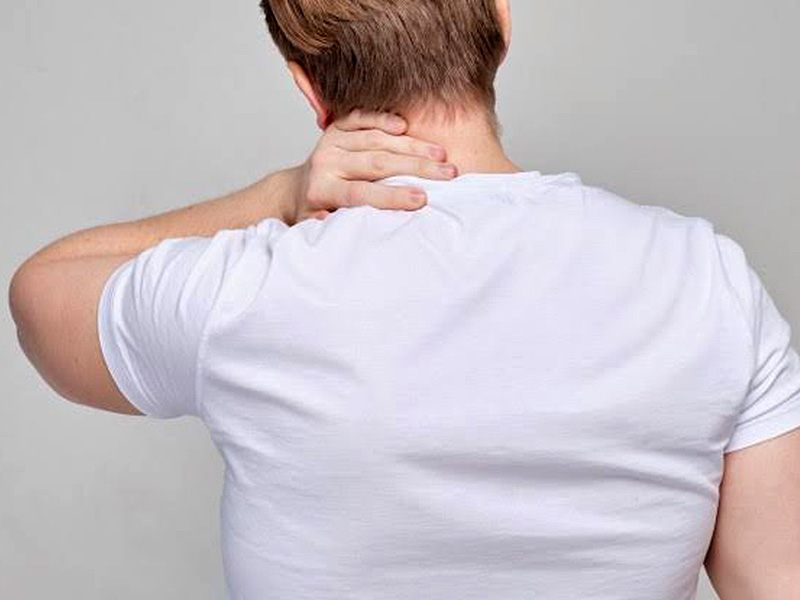
There are many reasons why back pain occurs. Sometimes it could be a result of an injury or a development of improper lifting techniques. Back pain can also be a sign of underlying conditions such as arthritis or herniated discs. Research by NCBI shows that 20 out of 1000 adults experience pain associated with herniated discs. People with herniated discs can lead a normal, happy, and healthy life with changes in their lifestyle. Onlymyhealth editorial team talked to Dr. Shuaib Kausar, Founder & Chief Orthopaedic Surgeon, Total Orthocare, to know about lifestyle tips to manage herniated disc.
Table of Content:-
What are Herniated Discs?
Herniated Discs refer to issues with the rubbery disc between the spinal bones. This condition occurs when the soft center of spinal discs pushes through a crack in the casing and may further press on the nerves in the spine. This situation may cause pain, discomfort, tingling, and even numbness. Herniated discs, also known as slipped discs, bulged discs, or ruptured discs, can be caused due to wear and tear too. Most herniated discs occur in the neck (cervical) and lower back (lumbar) regions; however, they can happen anywhere else.
Tips to manage herniated disc

It is crucial to know how one can reduce the risk of herniated discs or manage this condition with these 7 lifestyle changes and tips:
1. Regular Exercise
It is a great way to prevent back pain, especially back pain caused due to herniated discs. Regular exercise helps strengthen the core muscles, which can support the back even more. The stability of a strong core can reduce the risk of herniation. Also, maintaining a healthy weight is essential for a healthy spine, and certain exercises like cycling, swimming, or walking can help one lose weight without putting too much stress on the back.
Also read: What Is A Slipped Disc? Here Are Its Signs, Causes Treatment And Prevention Tips
2. Practice Good Posture
One should always practice good posture, like poor posture, whether sitting or standing, can contribute to lower back pain. Few tips like keeping the shoulders aligned over the hips while standing, keeping the chin parallel to the floor, and avoiding slouching, especially while sitting and working on a computer, are tips that need to be corrected to practice good posture.
Currently, as many people are still working from home, they can consider making a few changes to their at-home workstations, using a chair with lumbar support, and adjusting the computer monitor. Hence, it's directly at eye level. Twisting to see the screen can worsen the back pain.
3. Learn to lift heavy items properly
Often, people try to lift heavy objects by bending at the waist. One must practice safe lifting techniques to avoid harming the discs—improper lifting, like twisting while lifting, can put too much strain on the spine. Lift the items by bending the knees and standing up while keeping the back aligned.
4. Try to manage stress

One should manage the stress in day-to-day life as stress can lead to tight muscles and ligaments, which can further increase pressure on the spine.
5. Changing the position frequently
Staying in one position, whether standing or sitting for hours, without changing the positions can put pressure on the spine. It is advisable to move or stretch at least every 30 minutes. Staying in one position for a long time can also put pressure on certain spinal discs.
Also read: 6 Home Remedies To Treat Herniated Disc
6. Reconsider sleeping position
Good posture does not refer to standing and sitting alone; it also applies to sleeping postures. For example, sleeping on the stomach can put too much strain on the spine, especially on the cervical spine, so sleeping on the back or side is better. Healthy sleeping habits are good for the back and joints, especially for the shoulders and hips.
7. Avoid smoking
Smoking can not only impact lung health, but it can impact spinal health too? According to NCBI reports, smoking cigarettes is linked to higher incidence of back pain.
Some of the treatments for herniated discs include Rest, Physiotherapy to reduce stiffness and pressure on the nerves in the spine, medications and/or steroid injections to reduce pain and inflammation, hot or cold packs for pain relief, massage or chiropractic care. If the pain is mild or moderate, a herniated disc can be typically managed with non-steroidal anti-inflammatory medicine. In advanced stages patients are advised to undergo Surgery to get rid of their problem.
Though avoiding herniated discs is important for maintaining an active lifestyle, there are chances that despite the best efforts, discs may become herniated. The good news is that it is treatable, and surgery isn't always the final option. One can also try a self-healing exercise program. However, it is important to consult with the doctor to determine the actual condition and best treatment options.
Image credits: Freepik
Also watch this video
How we keep this article up to date:
We work with experts and keep a close eye on the latest in health and wellness. Whenever there is a new research or helpful information, we update our articles with accurate and useful advice.
Current Version